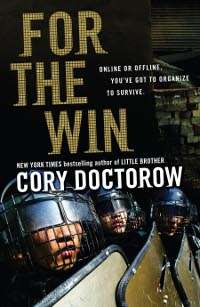For the Win

Gold. It's all about gold.
Svartalfheim Warriors. Zombie Mecha. Clankers. Mushroom Kingdom. Savage Wonderland. And more, and more.
An undefined period into the future, World of Warcraft is ancient history. Eight of the 20 largest economies in the world are virtual, including three run by Coca-Cola. Nine million people -- Chinese, Indian, Malay, Vietnamese, even some Americans -- make their livings through them, including uncountable gold farmers. Whenever it's more fun to have virtual gold than to not have it, there'll be money to make by gathering it.
Just one thing: Most of that money isn't being made by the gold farmers themselves, the players who work 12 or 18 hours a shift for a pittance and know the games inside out, know exactly where and how to wring the most gold out of them. Most of the money goes to their bosses. Want better conditions? You're fired and replaced with someone else who wants your job. Try to strike out on your own? Your boss sends his goons.
These problems have been faced by laborers before, in the 20th century. The solution they came up with was unions. If one worker wants more money, he can be replaced. If all of them want more money, suddenly the boss's position is much more precarious. Of course, most of these workers are in countries without strong labor rights laws -- some countries prohibit all unions. And there's the matter of globalization -- if you unionize gold farmers in China, their bosses will just replace them with Indonesians; after all, the companies that own the games sell subscriptions around the world. Really, any job has the same problems, even the ones involving production of physical goods. They can be outsourced to anywhere factories can be built and container ships can be docked.
Funny thing about globalization, though: When it comes to MMOGs, it works both ways. If you're a union recruiter operating in Mushroom Kingdom, it makes no difference whether the workers are down the street or three thousand miles away. They're all in the same virtual worlds. Anywhere the bosses move the jobs, the recruiters can follow. And why stop at gold farmers? You could unionize Mechanical Turks, girls working in brick-and-mortar factories -- everyone. But that'd take someone either very reckless or very, very clever...
Cory Doctorow's For the Win differs from his previous young adult novel, Little Brother, in the lack of a single protagonist providing the sole perspective. Instead, there are several viewpoint characters, including:
- Big Sister Nor, the former textile worker who started the Industrial Workers of the World Wide Web (the "Webblies").
- Justbob and The Mighty Krang, BSN's lieutenants.
- Mala, aka General Robotwallah, one of the most brilliant Zombie Mecha players around, who at age 14 earns more than fifteen times the rest of her family's income enforcing a gold-farming monopoly.
- Yasmin, General Robotwallah's right-hand woman, also 14, who has been having second thoughts.
- Matthew Fong, a 17-year-old master gold farmer who aims to run his own business, despite the displeasure it earns from Boss Wing.
- Leonard "Wei-Dong" Goldberg, who farms gold with his friends across the Pacific and sees the fragility of the world better than his father can.
- Lu, former security guard, tank guildmate of Wei-Dong, employee of Boss Wing, and employee of Matthew -- in that order.
- Conner Prikkel, chief economist for Coca-Cola's games division, who struck it rich when he devised equations that showed when virtual money and items were over- or undervalued.
- Ashok, an economist sympathetic to the Webblies.
As always, the novel can be found on Doctorow's site for free or in traditional bookstores and libraries.
- Author Filibuster: While they're not particularly long, the book contains frequent diversions talking about economics and the financial industry.
- Four Lines, All Waiting: They all get tied together eventually, but there are quite a few concurrent plotlines.
- Green-Eyed Monster: Connor observes that envy -- the thought that somebody might be getting rich and you aren't -- can be even more powerful than greed.
- Leeroy Jenkins: Wei-Dong's team's customer early in the book plays the trope completely straight, charging recklessly into the boss chamber and ruining the team's careful plans.
- Massive Multiplayer Scam: The Webblies organize a massive pyramid scheme.
- Real Money Trade
- The Con: Discussed
- Twenty Minutes Into the Future: Pinning down a timeframe is even trickier than with Little Brother. One of the most concrete clues is that Big Sister Nor has played Theater of War VII "since she was a little girl."